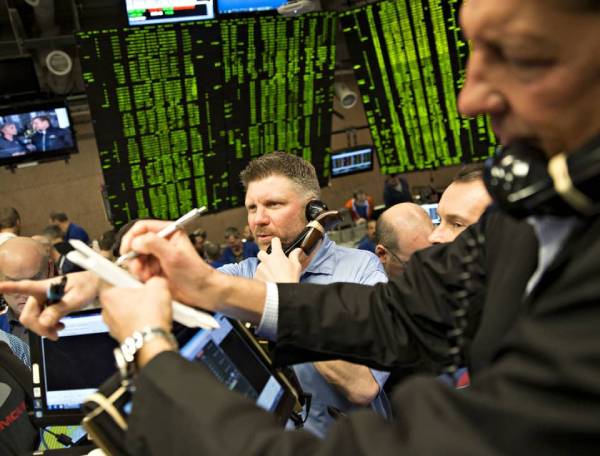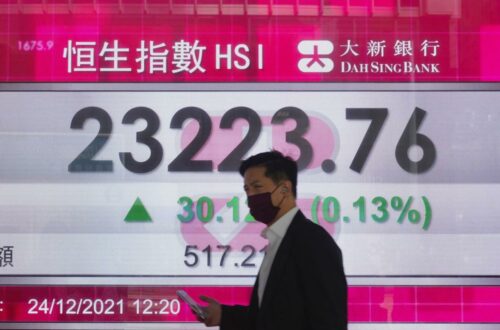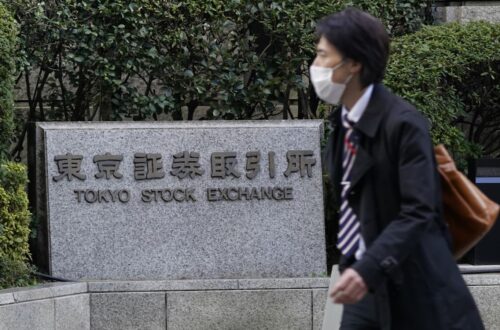
Hong Kong’s Hang Seng falls 1% as tech shares drops; financial backers screen bitcoin instability
- Financial backers observed crypto after bitcoin costs were unpredictable consistently, dropping forcefully Saturday early evening time during Asia hours.
- Tech stocks fell in Hong Kong, while pained Chinese property foster Evergrande additionally tumbled.
- Four new stocks — including Chinese innovation goliaths JD and Netease — were added to the benchmark Hang Seng file, while grieved Chinese property designer Evergrande will be eliminated from the China Enterprises record.
Stocks in Hong Kong dropped on Monday, while financial backers checked bitcoin costs after they fell strongly over the course of the end of the week. Oil costs bounced during Asia exchange.
Alibaba partakes in Hong Kong fell almost 8% in early exchange, yet later recuperated somewhat to decay 5.36%. The organization reported Toby Xu, its vice president monetary official, will succeed Maggie Wu as CFO. That change will be compelling Apr. 1.
Hong Kong’s Hang Seng file fell 1.26%, as tech stocks fell. JD dropped over 3% and Tencent was down 2.68%.
Four new stocks — including Chinese innovation goliaths JD and Netease — were added to the benchmark Hang Seng list. The most recent update expands the quantity of stocks in the primary record to 64, from the current 60 stocks.
That followed Friday’s misfortunes in portions of Chinese firms recorded in the U.S., as they dropped on worries about stricter administrative investigation after Didi declared it would delist from the New York Stock Exchange.
Simultaneously, pained Chinese property designer Evergrande will be taken out from the China Enterprises record.
“If the Group can’t meet its assurance commitments or certain other monetary commitments, it might prompt banks requesting speed increase of reimbursement,” it said.
Evergrande, involved under water issues, cautioned Friday in a documenting with the Hong Kong trade that it has gotten an interest to reimburse about $260 million.
Evergrande shares plunged more than 12%.
Central area Chinese stocks, be that as it may, rose. The Shanghai composite rose 0.37% while the Shenzhen part was up 0.16%.
Other Asia-Pacific business sectors blended
Australia’s S&P/ASX 200 edged up 0.14%, likewise recuperating from slight misfortunes prior.
Japan’s Nikkei 225 pared before misfortunes, falling 0.39%, while the Topix was down 0.42%. South Korea’s Kospi was up 0.20%, pivoting from a decrease of 1% prior.
“This week would be significant as we would probably improve read of the Omicron’s seriousness,” DBS wrote in a Monday note. “During the Delta variation flood in August, tech stocks held up better. That didn’t occur this time, with the Nasdaq remedying more than the S&P 500 or the Dow Jones record.”
MSCI’s broadest list of Asia-Pacific offers outside Japan plunged 0.45%.
“The blend of Omicron fears, forthcoming more tight Fed strategy and feeble values opinion is demonstrating hard to process, starting interest for security in longer-term US Treasuries,” it added.
Stocks across the locale and worldwide have seen tempestuous exchanging since keep going week on feelings of dread encompassing the new omicron variation.
Oil costs bounce
Oil costs climbed over 2% in early Asia exchanging hours after for the most part falling keep going week on Covid vulnerability and the OPEC+ plan to expand yield in January.
Brent prospects were up 2.12% to $71.36 per barrel, while U.S. West Texas Intermediate rough rose 2.23% to $67.74 per barrel.
Bitcoin unpredictability
Financial backers will keep on checking crypto after bitcoin costs were unstable consistently, dropping forcefully Saturday early evening time during Asia hours. Bitcoin at first lost around 17%, or $10,000 — tumbling to a low close $43,000.
The U.S. dollar record, which tracks the greenback against a container of its companions, was at 96.264, proceeding with its ascent from levels around 96.1 in the past meeting.
Bitcoin was at $49,303 starting at Monday early evening time during Asia hours. In any case, the digital money has lost more than 10% since Friday.
The Japanese yen exchanged at 112.98 per dollar, debilitating somewhat. The Australian dollar was at $0.7022, edging higher from levels around $0.69 prior.
Mia is a literature author. Mia was not interested in becoming a writer when she was a child, a fact which she himself admits that separates her from fellow writers she has met. As a young adult, Mia did not know what she wanted to be. she remembered, however, how in high school, she had been a class clown, and that made her decide to become a books writer. Later on, she moves toward the writing news articles. In recent she writes her news on Stock Invests.
Disclaimer: The views, suggestions, and opinions expressed here are the sole responsibility of the experts. No STOCK INVESTS journalist was involved in the writing and production of this article.





